Hi, I’m arts writer Deborah Vankin, filling in for Carolina Miranda this week.
A 5-year-old public sculpture, honoring a Persian emperor of 2,600 years ago, is now tragically timely.
The 2017 sculpture, “Freedom: A Shared Dream,” sits on Santa Monica Boulevard in Century City, featuring gold and silver concentric cylinders made of stainless steel. It shimmers in the sunlight and glows, with LED lights, at night. It’s by British artist Cecil Balmond and was commissioned by the L.A. nonprofit Farhang Foundation, which promotes Iranian art and culture.
The work now serves as a focal point for the “Women, Life, Freedom” movement supporting Iranian women and human rights. Artists and others are tying scarves and ribbons to the work, multicolored slips of fabric that billow and whip in the wind protesting the September death of 22-year-old, Kurdish Iranian Mahsa Amini. She’d been arrested by Iran’s so-called morality police for not wearing her hijab, an Islamic headscarf, properly and died in detention.
In the wake of mounting protests in Iran, sparked by Amini’s death, and reports of human rights abuses in the country, the Century City sculpture now also stands in solidarity with demonstrators there. Authorities in Iran have cracked down on protesters, and there have been reports of physical and sexual abuse of detainees. (This recent CNN piece about a “full-fledged human rights crisis” in Iran is painful to read.)

A detail of Cecil Balmond’s sculpture, “Freedom: A Shared Dream.” The work gives voice to demonstrators in Iran, fighting for their basic human rights.
(Photo: Vafa Khatami; from Farhang Foundation)
“The declaration of human rights is a precious jewel for humanity,” Balmond told me when I interviewed him in 2016, “and I conceived the sculpture as such, a golden treasure [being the inner gold cylinder] buried within the surface silver, the appearance of our lives.”
With international Human Rights Day coming up on Dec. 10 — and the protests in Iran still going on — the “Women, Life, Freedom” rallying cry is louder than ever. Artists and activists handcuffed themselves to Chris Burden’s “Urban Light” installation at LACMA last month for a demonstration marking 40 days since the Zahedan massacre in southeastern Iran and drawing attention to Amini’s death. Additional “Women, Life, Freedom” artworks are now popping up around Los Angeles.
The Farhang Foundation launched a billboard campaign in the Westwood area in early October featuring the “Freedom” sculpture — the two images will be up through the end of the year. The organization is now putting up new murals around the city. One, designed by Iranian American Washington D.C.-based artist, Rashin Kheiriyeh, appears on the side of an office building in Santa Monica. The mural, at 3325 Pico Blvd., was originally unveiled in July 2021 before Amini’s death; but it spoke to freedom for women in Iran. It’s since been updated. It depicts a woman with flowing hair made of Persian calligraphy. A line from a Persian poem reads: “restless tresses in the breeze.” “Women, Life, Freedom” appears in English and Persian.
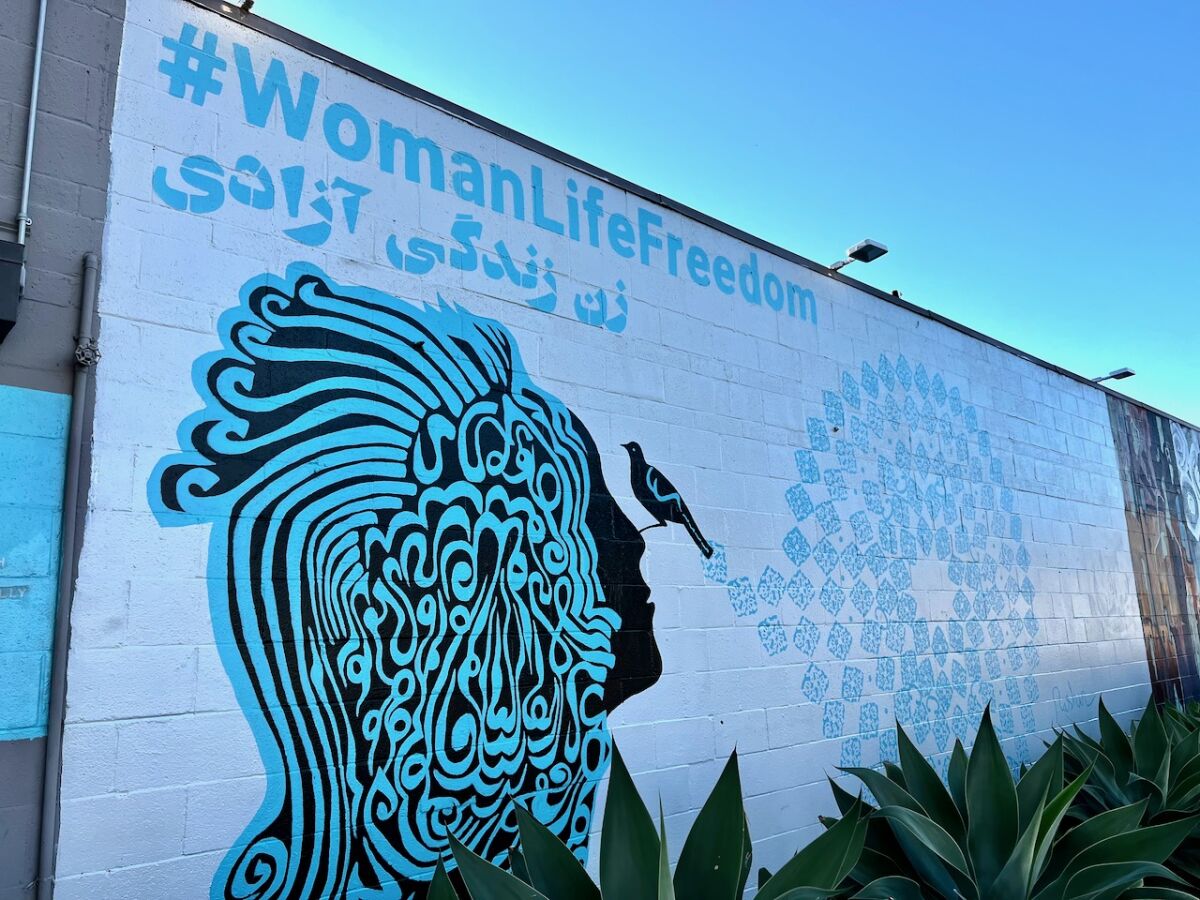
A mural by Rashin Kheiriyeh on the side of an office building in Santa Monica.
(From Farhang Foundation )
Another Farhang Foundation mural is in-development, planned to appear on the side of a downtown L.A. office building that currently features a Shepard Fairey mural. The image for the 1031 S. Grand Ave. mural is still being worked out. It will either be by Kheiriyeh or Iranian American L.A.-based Farzad Kohan. The mural is meant to be a permanent work and will feature the “Women, Life, Freedom” hashtag.
Elsewhere around the city, artists are putting up their own murals. The exterior of a shoe store on Melrose Avenue, in the Fairfax District, now features a nearly 30-foot-tall mural of Amini, clad in black and eyes cast downward with the colors of the Iranian flag flowing through her hair. Silhouettes embedded in her clothing depict Iranian women tossing off their veils and setting them on fire. At the bottom, in Persian script, it reads: “Death to the dictatorship.” The 7753 Melrose Ave. mural is by Iranian American L.A.-based artist Cloe Hakakian and L.A. muralist Todd Goodman. It was unveiled in early October and was paid for by the artists, with some community donations.

A Melrose Ave. mural by Cloe Hakakian and Todd Goodman.
(Photo: Impermanent Art)
Hakakian has since started a not-for-profit initiative, Murals for Freedom, which connects artists and wall owners internationally to create awareness around the “Women, Life, Freedom” movement.
“I’m Iranian American before anything else, I feel my roots deeply,” she told me. “And I just wanted to be the voice for the voiceless.”
Iranian American L.A.-based rapper Shaheen Samadi, an emerging artist, wrote a song supporting the “Women, Life, Freedom” movement in collaboration with L.A. musician Dr. Symph (a.k.a. Dr. Mansour Zakhor). He performed it in front of a new Tarzana mural, by Iranian American L.A.-based artist Keyvan Shovir. It depicts Amini without a headscarf along with 16-year-old Iranian protestor, Nika Shakarami, who went missing on Sept. 20 and has since been declared dead. In the mural, at 19449 Ventura Blvd., Shakarami is holding a microphone. The music video appears on Samadi’s social media.
“How do we help from thousands of miles away,” Samadi wrote on his Instagram post featuring the video. “How do we help defend our people from torture, bullets, from twisted people using religion to cause pain and suffering in our beautiful motherland?”
“I’m a practitioner of this art-form that we call rap music,” he added. “This is my weapon, this is the sword I’ve spent the last 12-13 years sharpening.”
Meanwhile, Roshi Rahnama’s West Hollywood gallery Advocartsy, featuring Iranian contemporary art, debuted a solo exhibition called “Mohammad Barrangi: Dreamscape” on Sept. 22, just days after Amini’s death. “We were in a haze of mourning,” Rahnama told me. “We weren’t able to engage in any festive activities or in the mood to celebrate the exhibition.”
After it closed on Nov. 5, and because the gallery had canceled its annual Holiday Hang community celebration while mourning Amini, Rahnama scrambled to put together a new show called “Inspired By Woman, Life, Freedom.” It features relevant reverse transfer works from “Dreamscape” as well as new mixed media works by Iranian American San Francisco-based artist Ali Dadgar. She asked artists who’d previously shown at the gallery to ship back work to be exhibited. Artists who contributed “returning works” included Iranian American San Francisco-based Shadi Yousefian and Iranian Canadian Toronto-based Simin Keramati. “Inspired By” will be up through Dec. 30.
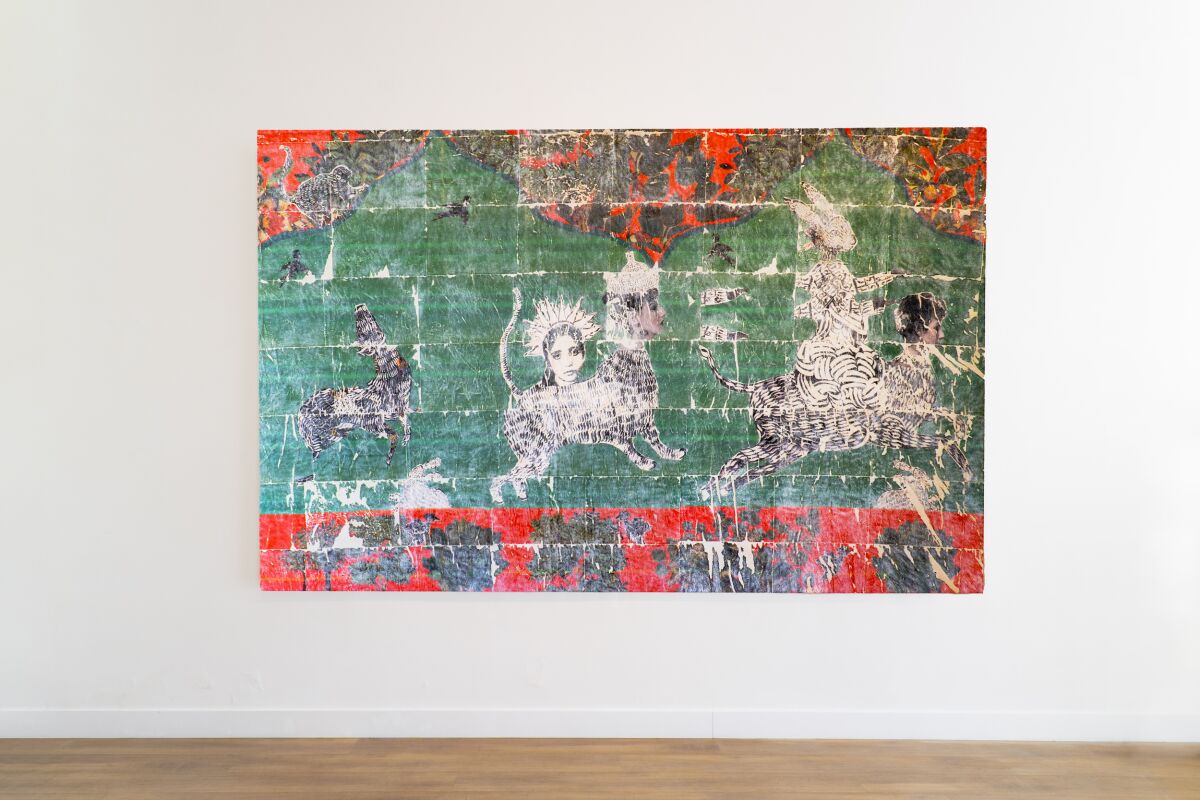
A reverse transfer on canvas, “Guardians of Eden”(2021), by Mohammad Barrangi at Advocartsy.
(Mohammad Barrangi)
“I was trying to do something responsible with our gallery,” she says. “And this was the most effective way we could create a dialogue that would bring more attention to this important movement and revolution in Iran. Our language is art. It was a call to action and I stepped into it.”
This is by no means a comprehensive list — previous “Women, Life, Freedom” billboards have come down and new murals will undoubtedly go up, for however long they last. But even the ephemerality is powerful, says Farhang executive director, Alireza Ardekani.
“What’s happening in Iran, the people who are out in the streets fighting for their freedom, they appreciate and get energized knowing that other people around the world are supporting their cause, hearing their voice — they are not silenced,” he says. “And art is the most powerful way to do that.”
And here’s what else is happening across the L.A. artscape …
Visual art
The taboo-busting, 73-year-old Alexis Smith stopped making art about six years ago due to illness, but a major exhibition at the Museum of Contemporary Art San Diego underscores what Times art critic Christopher Knight calls her “pivotal importance.” The show of 51 works, he says, is “a marvelous, long-overdue retrospective of the Los Angeles artist’s exceptional career.”
Knight also reviews a survey of 27 paintings from the last 21 years by Honolulu-born, Los Angeles-based painter Rebecca Morris at the Institute of Contemporary Art, Los Angeles. “ In a period when figurative painting with distinct social narratives has been dominant,” he writes, “while facile abstract painting abounds, a fine survey of Morris’ savvy, often unexpected abstractions is especially disarming.”

Alexis Smith, “Red Carpet,” 2001, mixed media
(Philipp Scholz Rittermann)
It’s been 20 years since William Kentridge has had a major exhibition in L.A. Leah Ollman has an interview with the South African artist on the occasion of his Broad exhibition, “William Kentridge: In Praise of Shadows.” To Kentridge newbies, Ollman says, the exhibition — which features about 130 works dating from 1975 to 2020 — is “a feast of an introduction.”
An exhibition at the Skirball Cultural Center, “Fabric of a Nation: American Quilt Stories” — which debuted at the Museum of Fine Arts, Boston last year — aims to answer a fundamental question through the lens of 42 works on view, writes Leigh-Ann Jackson: “What is the story of America and what parts of it can be told through quilts?”
Frieze Los Angeles is back — or it will be, in February 2023, bigger than ever at the Santa Monica Airport. Here’s my report, with details about the art fair’s next iteration in L.A.
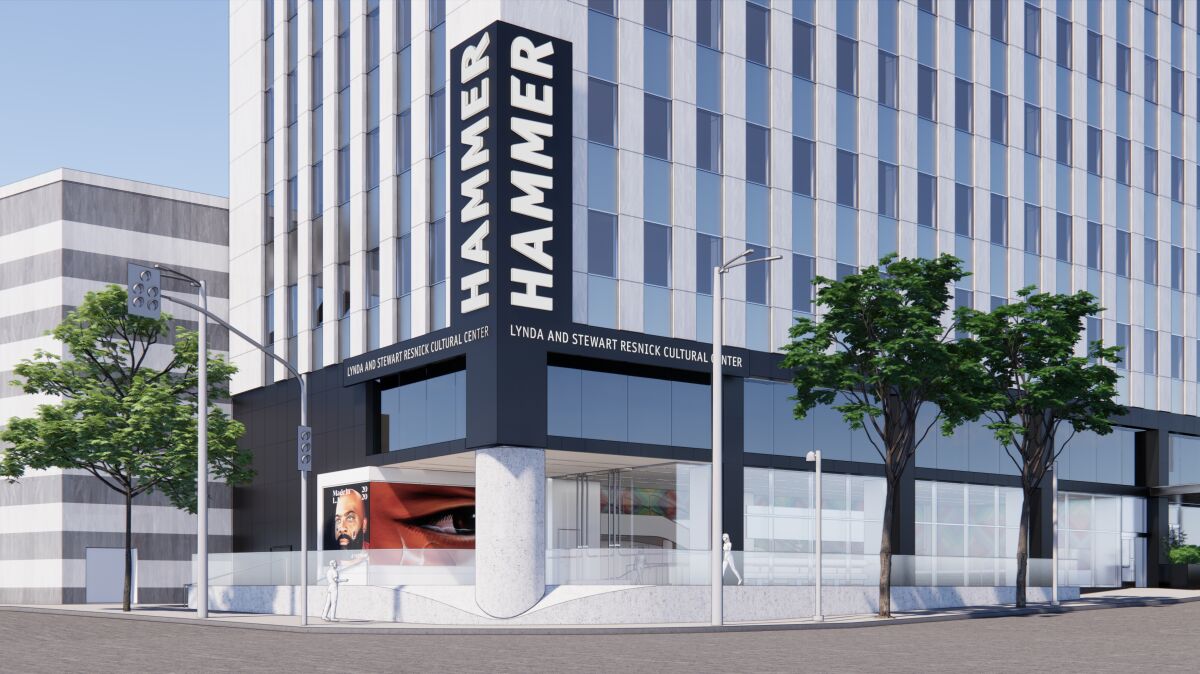
A rendering of the Hammer Museum’s new corner entrance at Wilshire and Westwood. It debuts in March 2023.
(From Michael Maltzan Architecture )
And if you haven’t been to the Hammer Museum recently, you may not recognize the place. It’s nearing the end of a two-decade expansion and renovation that will be unveiled, once and for all, in March. Here’s my interview with museum director Ann Philbin about the museum’s transformation and what we can expect to see there.
On and off the stage
On the occasion of Tom Stoppard’s “stunning new play on Broadway,” “Leopoldstadt” — about a Jewish family in Vienna during the Holocaust — Times theater critic Charles McNulty interviews author and San Francisco American Conservatory Theater former artistic director, Carey Perloff. Her “Pinter and Stoppard: a Director’s View” explores the two English playwrights’ Jewish identities.
“Infusing her personal knowledge of the artists with her practical experience of staging their work,” he writes, “Perloff sheds light on what makes “Leopoldstadt” distinctive yet wholly integrated into Stoppard’s oeuvre.”
Margaret Gray has the story on “Clyde’s” at the Center Theatre Group’s Mark Taper Forum. Lynn Nottage’s 2021 Tony-nominated dark comedy is set at a truck stop sandwich shop. “The greasy spoon’s sandwiches are unexpectedly delicious,” Gray writes, “but as a workplace, it’s not healthy; in fact its toxicity is operatic in scope.”
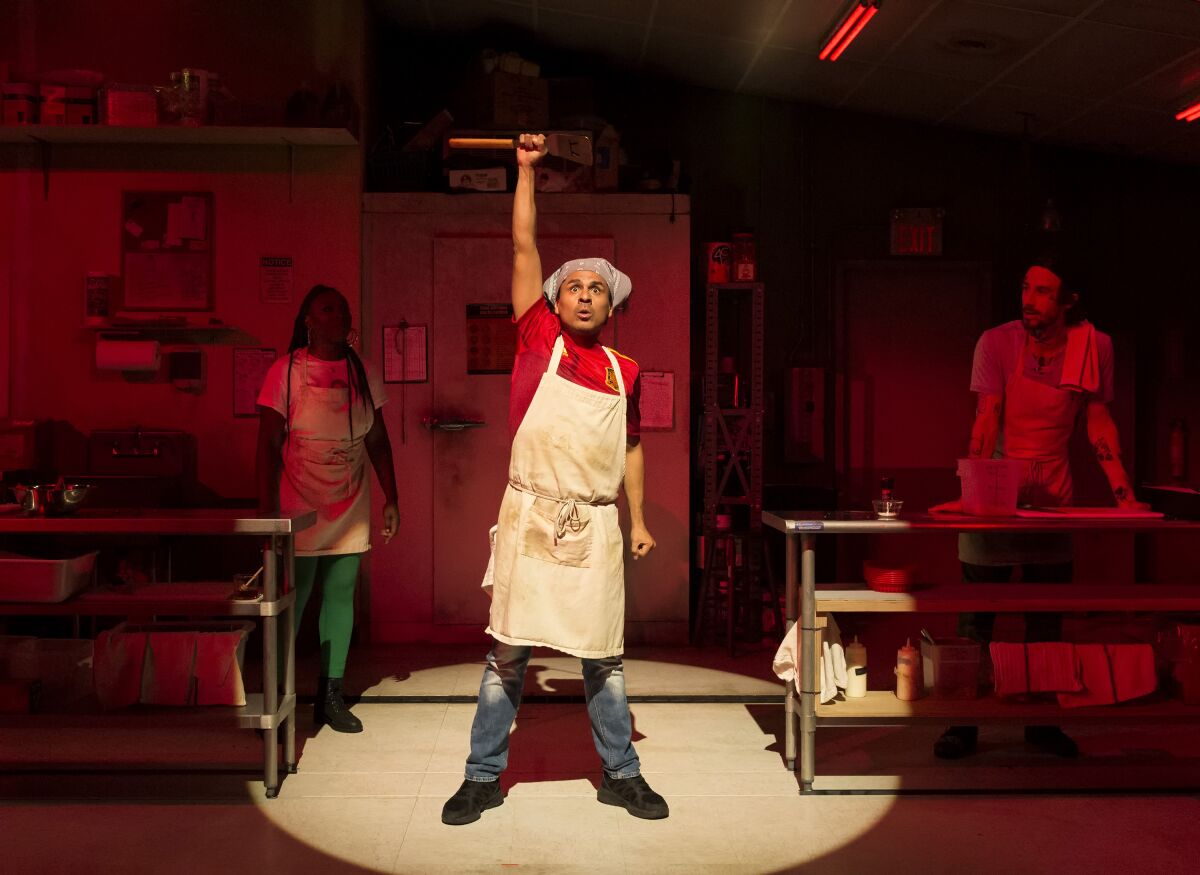
Nedra Snipes, Reza Salazar (center) and Garrett Young in the West Coast premiere of “Clyde’s” at Center Theatre Group / Mark Taper Forum
(Craig Schwartz/All Uses © 2022 Craig Schwartz)
Is laughter the best medicine? Comedian Alex Hooper would say so. Arts writer Jessica Gelt interviews Hooper, who recently was diagnosed with Stage 3 Hodgkin’s lymphoma — a topic he plumbs for comedic material. He’s performing around L.A. while undergoing chemo.
“With preternatural positivity and boundless amounts of love for his fellow comedians, his family and his audience,” Gelt writes, “Hooper has managed to turn cancer into a punchline and inspire his fans to appreciate life in the process.”
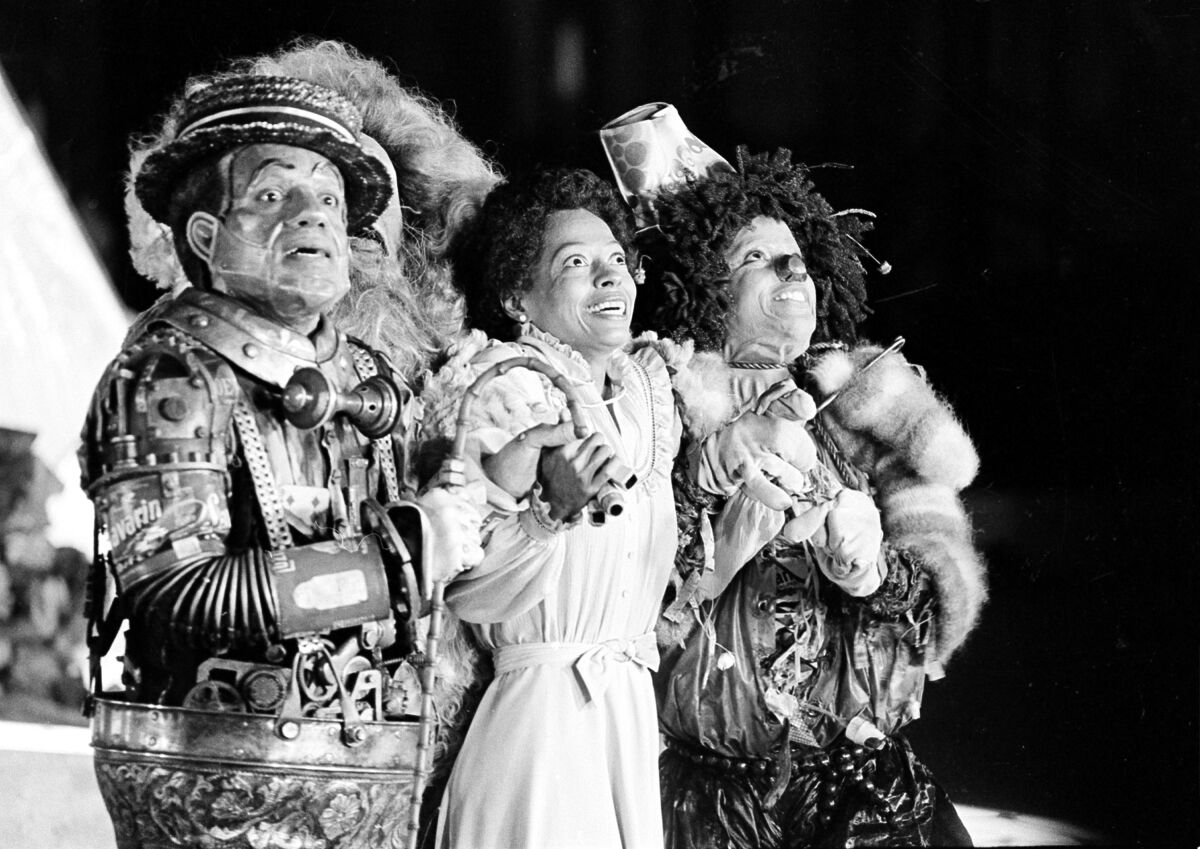
Diana Ross, center, as Dorothy, Michael Jackson, right, as Scarecrow, and Nipsey Russell as the Tin Man during filming of the musical “The Wiz” in New York on Oct. 4, 1977.
(Uncredited / Associated Press)
And, finally …. A new adaptation of the Tony Award-winning musical, “The Wiz,” will return to Broadway in 2024, entertainment reporter Nardine Saad reports. But first, there will be a national tour that debuts in Baltimore next year.
Classical notes
Did the L.A. Opera’s “Tosca,” a revived production by British director John Caird, move the needle in terms of the art form’s evolution? Maybe not, says Times classical music critic Mark Swed. But it was impressively sung; the crowd was impressively dressed; and Angel Blue, one of the production’s stars, was an impressive draw.
“What struck me Saturday night was the sheer pleasure the audience took in being in an opera house for an opera,” Swed writes, “in being in a world that felt, for three hours, like a welcome refuge from the ordinary.”
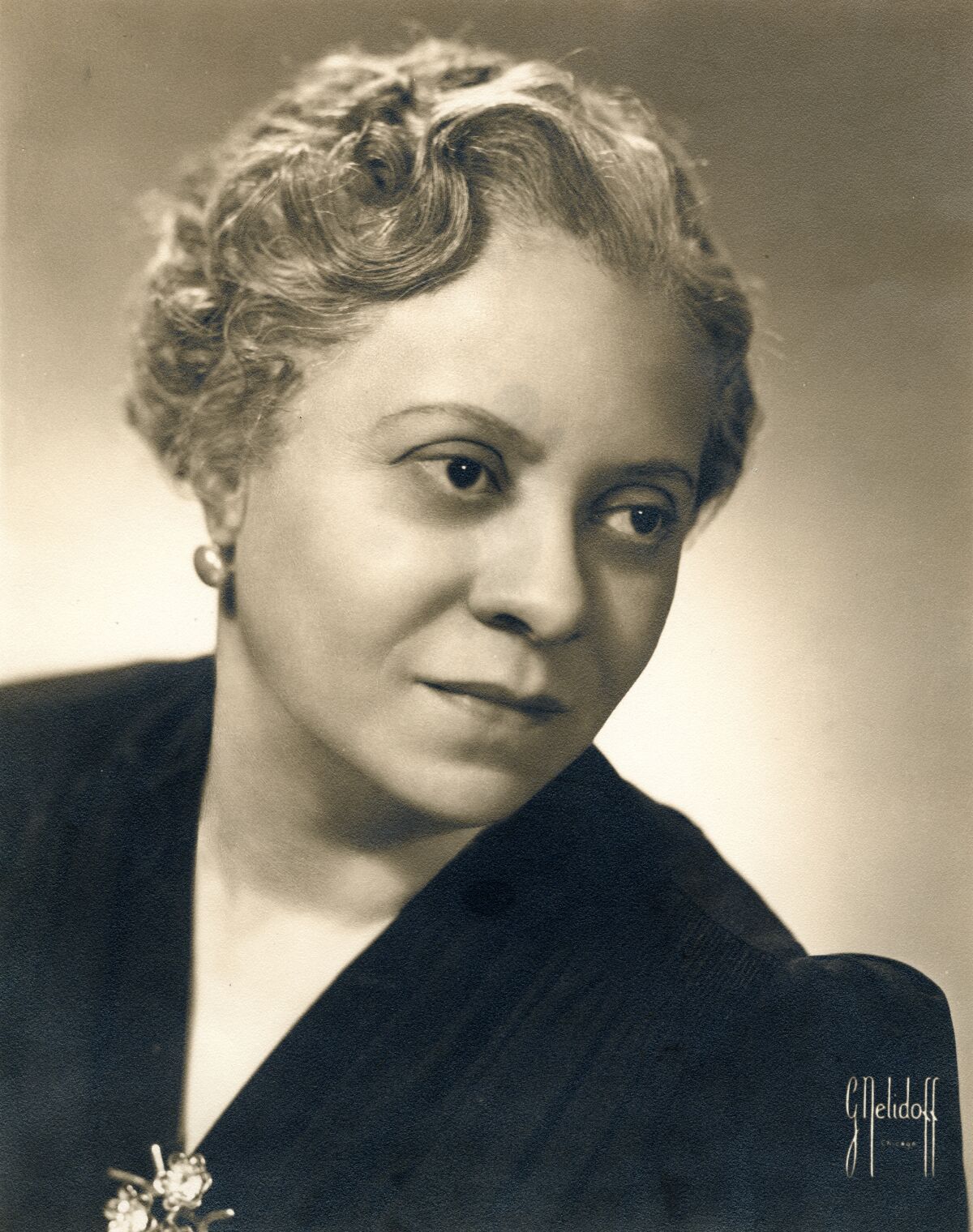
Florence Price (1888-1953) was the first Black American woman to have her music played by a major orchestra.
(University of Arkansas Libraries Special Collections)
The late, trailblazing composer Florence Price was the first Black American woman to have her music performed by a major orchestra. Her work has found new appreciation in the last two years. The Los Angeles Philharmonic performed Price’s Third Symphony in Nov. as part of its Rock My Soul Festival — it was a performance “conducted with a vivid, clear-eyed edge by Jeri Lynne Johnson,” Swed says.
“It is a score of great beauty, considerable grace and rapt expression,” Swed writes. “Its substance comes from the use of spirituals and African American dance in a symphonic manner, modeled after Dvorák’s example in his ‘New World’ Symphony. Not to be moved by the score and its composer, who rose above the racism and misogyny in classical music, requires a cold heart.”
Just dance
On the occasion of L.A.’s Banjee Ball celebrating its ninth anniversary, arts reporter Steven Vargas takes a look at ballroom culture as its inching into popular culture. “What started underground has gone mainstream,” Vargas writes, “so where does that leave events like the Banjee Ball, one of Los Angeles’ largest ballroom events?”
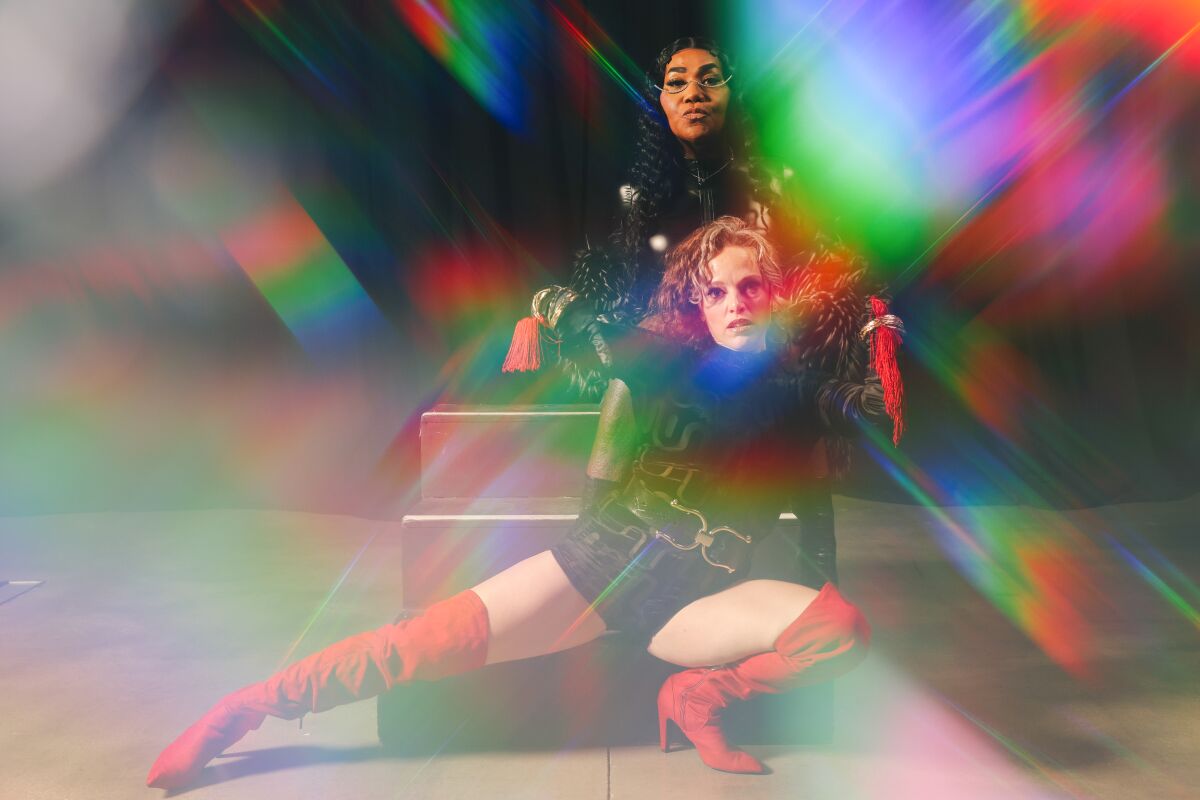
Voguers Isla Ebony, front, and Enyce Smith pose at Studio A Neuehouse Hollywood. They were part of a Banjee Ball, where ballroom and mainstream culture intersect.
(Dania Maxwell / Los Angeles Times)
Design time
Features writer Lisa Boone has the story behind a 700-square-foot ADU, whose exterior was “custom-milled” to match its main house, a century-old Craftsman in Culver City.
Books
McNulty takes a look at two new books, both “brazenly entertaining works of theatrical biography.” The first is “Shy: The Alarmingly Outspoken Memoirs of Mary Rodgers,” which was co-written with New York Times chief theater critic Jesse Green. The second is a series of interviews: “Finale: Late Conversations With Stephen Sondheim” by New Yorker writer D.T. Max.
“The crackle of these books,” McNulty writes, “has everything to do with the zingy forthrightness of their title characters.”
Meanwhile, Martin Wolk has an interview with “Little Fires Everywhere” author Celeste Ng about her new novel, “Our Missing Hearts.” Ng joins the L.A. Times Book Club on Dec. 8, at 6p.m. for a conversation with Times columnist Patt Morrison. Sign up here.
Essential happenings …
‘Tis the season. Good thing Matt Cooper has a “supersize list” of live holiday entertainment throughout Southern California. It’s got something for everyone, including the Los Angeles Ballet’s “The Nutcracker,” South Coast Rep’s “A Christmas Carol” and Zombie Joe’s “Cabaret Macabre Christmas” — and more.
Cooper’s trusty weekly list of other events includes the national tour of the musical “Annie,” at the Dolby Theatre; drag artist Alaska at the Regent in downtown L.A.; and the New Hollywood String Quartet at the South Pasadena Public Library.
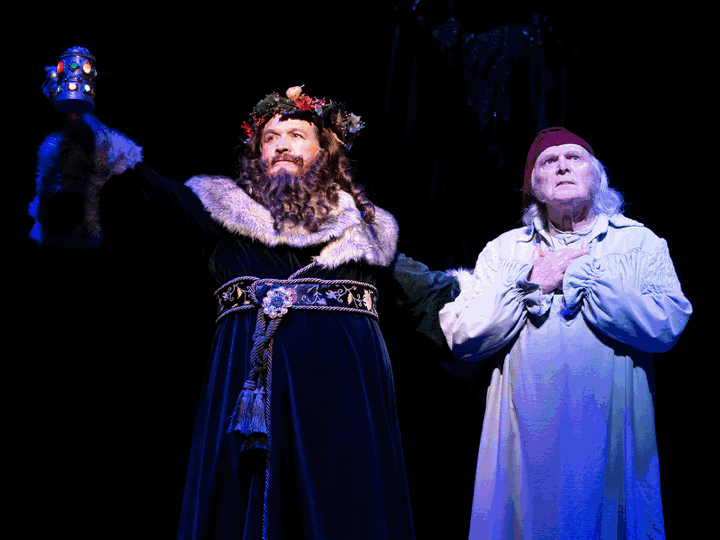
South Coast Rep’s “A Christmas Carol,” Zombie Joe’s “Cabaret Macabre Christmas,” Los Angeles Ballet’s “The Nutcracker” and Mariachi Reyna De Los Angeles make our list of holiday shows to see this month.
(Jenny Graham/SCR; Cailey Christ and Laura Van Yck; Reed Hutchinson; Hoy)
Vargas has been busy too. His most recent events roundup includes “Victor Estrada: Purple Mexican” at ArtCenter College of Design in Pasadena. The work in the exhibition of drawings, paintings and sculpture combines, as Vargas says, “1980s Los Angeles, the South Bay punk rock scene and Chicano art, music and politics.” Another event highlight: the bluegrassy variety show, “Watkins Family Hour Christmas” — hosted by Grammy-winning brother-and-sister duo Sean and Sara Watkins — at the Soraya in Northridge.
Want Vargas’ full list of where to go and what to do delivered to your in-box each week? Sign up for his newsletter, L.A. Goes Out. This week’s also includes a list of art-walks along top Metro lines for a car-free art outing.
Moves
Longtime American Ballet Theatre Artistic Director, Kevin McKenzie, is retiring after 30 years. But first: the holidays. McKenzie won’t step down until after the run of “The Nutcracker,” Dec. 9 to 16, at the Segerstrom Center for the Arts.
McKenzie started New York’s ABT Jacqueline Kennedy Onassis School in 2004, as well as the school’s subsequent National Training Curriculum. Throughout his career he’s steered ballet luminaries such as Ángel Corella, Paloma Herrera and Ethan Stiefel to Gillian Murphy, Stella Abrera, Misty Copeland, David Hallberg and Herman Cornejo.
And speaking of “The Nutcracker,” ABT’s James Whiteside was injured last year, onstage, during a performance of the holiday classic. He’s made a speedier-than-expected recovery and will be returning to perform in this year’s “Nutcracker” production, the ABT’s seventh at Segerstrom. Whiteside is also the author of the 2021 memoir, “Center Center: A Funny, Sexy, Sad Almost-Memoir of a Boy in Ballet,” essays that address his childhood, his coming out and being a man in ballet.
Passages
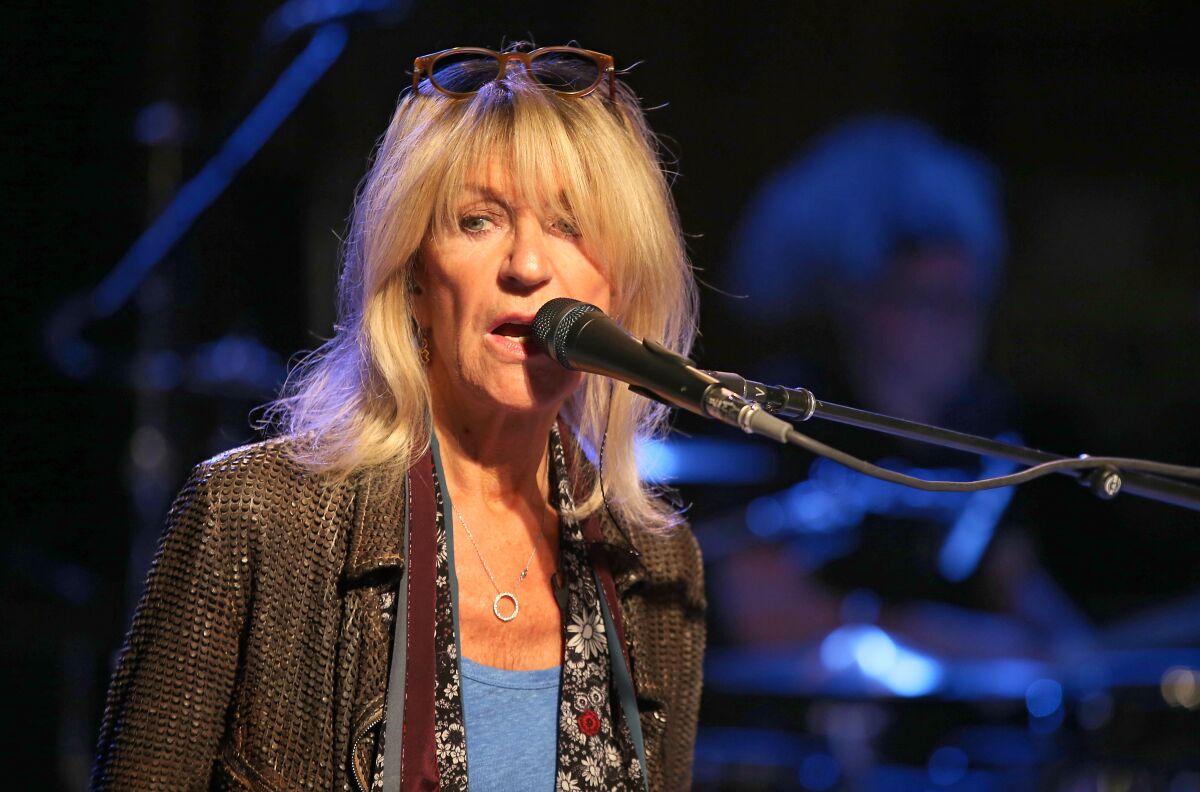
Christine McVie, of Fleetwood Mac, rehearses with band mate Lindsey Buckingham at Sony Studios in Culver City in May 2017.
(Luis Sinco / Los Angeles Times )
RIP Songbird. Singer, songwriter and keyboardist Christine McVie, of Fleetwood Mac, passed away after “a short illness,” her family said. She was 79. McVie brought us the hits “Don’t Stop,” “Songbird” and “You Make Loving Fun,” among others.
“Onstage, her steady presence behind the keyboard,” writes Times pop music critic Mikael Wood, “provided a crucial counterweight to the more dramatic figures cut by [Lindsey] Buckingham and [Stevie] Nicks, whose rocky romantic relationship powered the band’s darkly glamorous legend.”
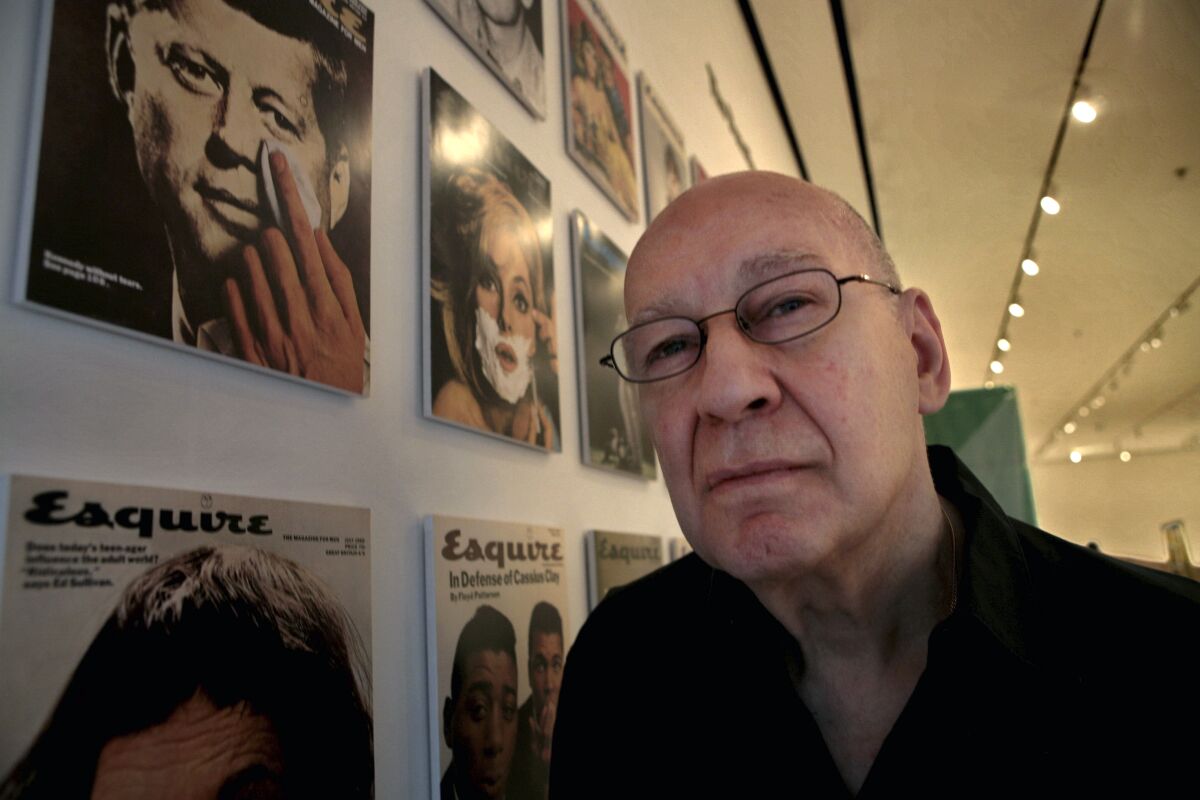
George Lois poses next to his artwork at the New York Museum of Modern Art in April, 2008.
(Bebeto Matthews / Associated Press)
Artist, designer and advertising man George Lois, who brought us catchphrases and brand names such as “I Want My MTV” and “Lean Cuisine,” passed away at 91 at his home in Manhattan.
He was, the AP reports, “among a wave of advertisers who launched the “Creative Revolution” that jolted Madison Avenue and the world beyond in the late 1950s and ’60s. He was boastful and provocative, willing and able to offend and was a master of finding just the right image or words to capture a moment or create a demand.”
And last but not least …
Here’s McVie, in her own words, discussing being a woman in rock ‘n’roll, the touring life and her early days as an art student.
“I’ve learned to be humble,” she says. “I don’t think money’s gone to my head. I don’t think being a star’s gone to my head, either. In blunt terms, I am a star, you know? But to say those words doesn’t really ring true to my emotions.”
Stay connected with us on social media platform for instant update click here to join our Twitter, & Facebook
We are now on Telegram. Click here to join our channel (@TechiUpdate) and stay updated with the latest Technology headlines.
For all the latest Music News Click Here
